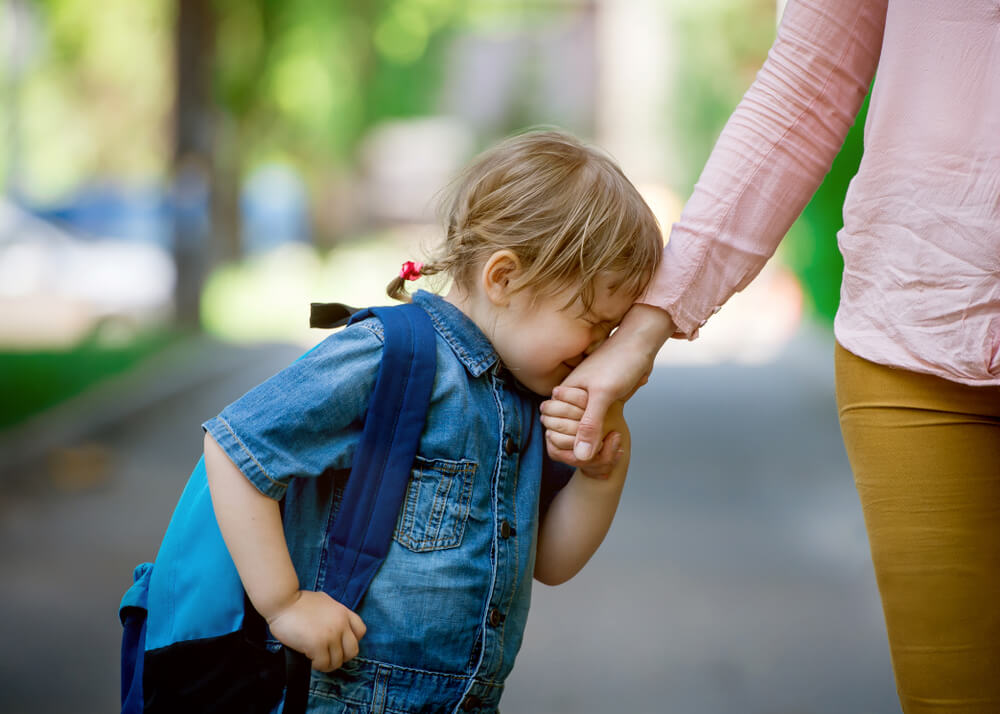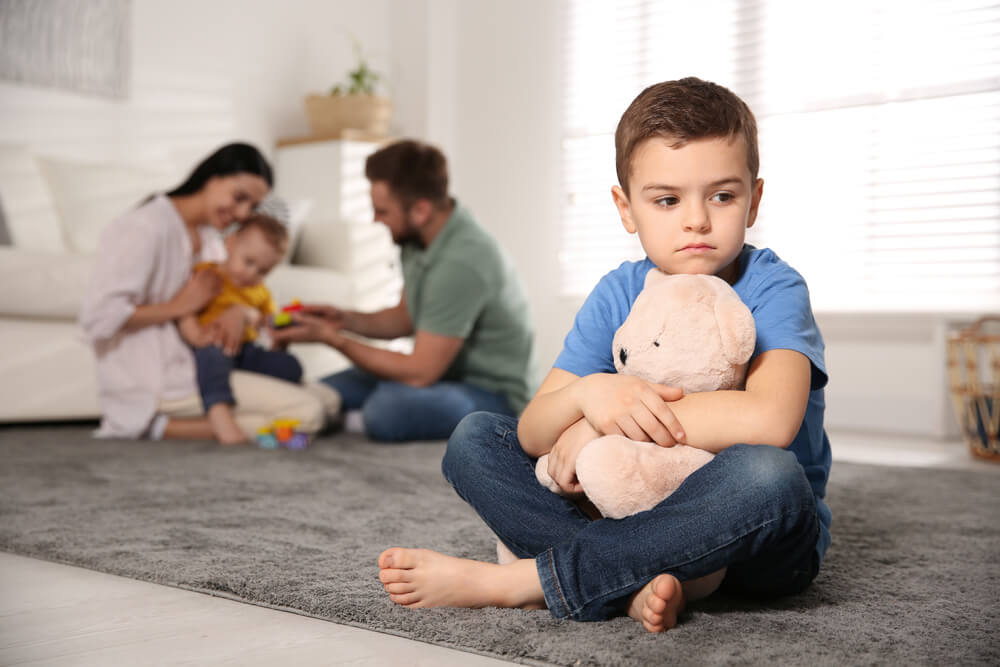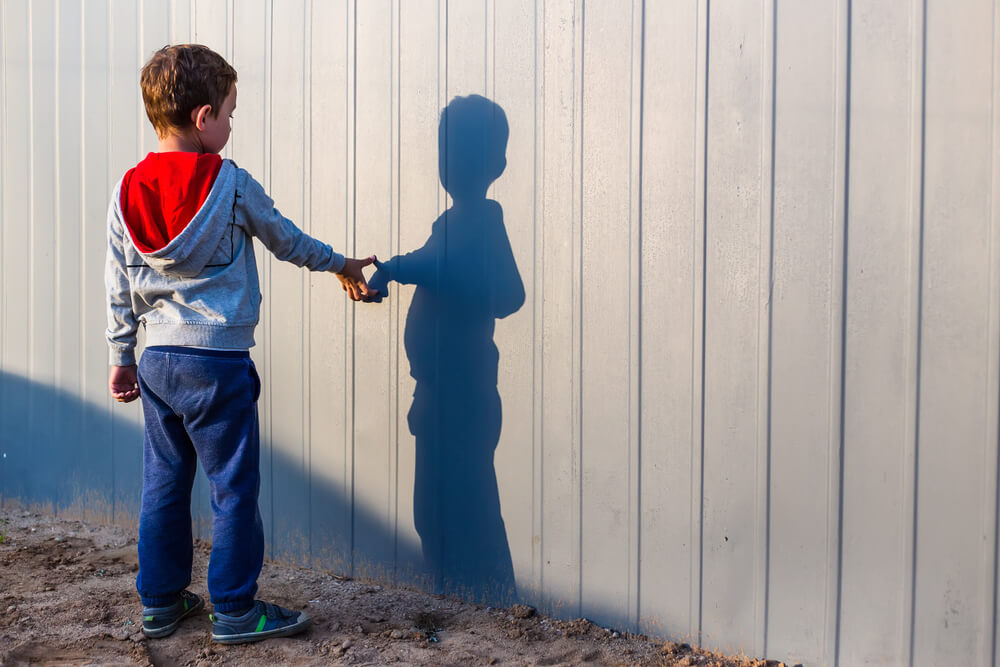Recognizing and Managing Abandonment Issues in Kids and Adults

Some certain events and behaviors leave a lasting impression on children that they must deal with as adults. One of these issues includes abandonment trauma or fear of abandonment. In order to overcome the fear of being abandoned, it’s important to fully understand what it is, its causes, and its signs.
Contents:
- What is a Fear of Abandonment?
- Signs and Symptoms of Abandonment
- What Causes Fear of Abandonment?
- How Does Abandonment as a Child Affect You as an Adult?
- How to Help a Child with Abandonment Issues
- How to Overcome Abandonment Issues as an Adult
- FAQs
What is a Fear of Abandonment?

fizkes/Shutterstock.com
Fear of abandonment is a deep-seated anxiety that surfaces when an individual perceives a threat of being left alone or separated from loved ones. It’s a feeling grounded in the worry that those who are important to you will leave, either physically or emotionally.
This fear can manifest in both children and adults, and it often stems from early attachment experiences. When someone grows up without a stable and reliable source of emotional support, the anxiety about being abandoned can persist into adulthood.
Despite its profound impact, fear of abandonment is not classified as a medical issue. Instead, it is considered a psychological and emotional challenge. People experiencing this fear often feel an overwhelming sense of helplessness and insecurity when they think they might lose a significant relationship.
Those with a fear of abandonment may also suffer from phobias of being isolated or alone, such as autophobia, monophobia, eremophobia, and isolophobia.
It’s important to recognize that this fear is common and can be addressed through various coping strategies and support systems.
The intensity and expression of this fear can vary widely from person to person. For some, it might appear as a constant undercurrent in their daily lives, while for others, it might only surface in specific situations.
Understanding that this fear is not a medical diagnosis, but rather an emotional experience is the first step toward managing and overcoming it.
What is Abandonment Trauma?

Studio Romantic/Shutterstock.com
Abandonment trauma occurs when an individual has experienced a significant and often sudden loss of an attachment figure, such as a parent or significant caregiver. This kind of trauma is typically rooted in early childhood but can also manifest in adults.
Unlike the generalized fear of abandonment, abandonment trauma is the result of specific events that leave deep emotional scars. These events can lead to chronic feelings of anxiety, trust issues, and difficulties in forming secure relationships.
While the fear of abandonment is a general concern or anxiety about losing someone close, abandonment trauma is more specific and intense. It often involves episodes of neglect, abuse, or loss that create a lasting impact.
People with abandonment trauma might exhibit symptoms such as clinginess, extreme emotional responses, or a heightened sense of vigilance.
Signs and Symptoms of Abandonment
There are many signs of fear of abandonment. Recognizing these signs early can help in seeking appropriate support and addressing the root causes of the fear of abandonment.
Signs of Abandonment Issues in Children

Sharomka/Shutterstock.com
Children with a fear of abandonment symptoms often display a range of behaviors that reflect their anxiety and distress regarding the possibility of separation from their caregivers.
Separation Anxiety
One of the most apparent signs is separation anxiety. This manifests as excessive crying, clinginess, and tantrums when it’s time to part ways, even for short periods. These children may also exhibit sadness, moodiness, or agitation when anticipating separation.
Struggle with Forming Friendships
Another significant symptom is difficulty forming friendships. Children with abandonment trauma may struggle to connect with peers, meaning they fear they might also leave or reject them. This often results in isolation or withdrawal from social activities.
Such children might exhibit hypervigilance, constantly monitoring their surroundings for signs of potential separation or rejection.
Developmental Regression
Regression in developmental milestones can also signal a fear of abandonment. A child might revert to earlier behaviors such as bed-wetting, thumb-sucking, or speech patterns they had previously outgrown.
This regression is often a way to seek additional comfort and reassurance from their caregivers.
Low Self-Esteem

Andrew Angelov/Shutterstock.com
Children who fear abandonment might also display low self-esteem. They often feel unworthy of love and care, manifesting as a lack of confidence in their abilities and a reluctance to try new things.
This low self-worth can be exacerbated by an underlying fear of the idea of not being good enough to retain their caregiver’s affection.
Difficulty Sleeping and Nightmares
Another key symptom is the presence of nightmares or sleep disturbances. These children might experience recurring dreams about being lost or abandoned, leading to frequent night waking and difficulty sleeping alone.
Their fear may translate into a reluctance to go to bed or needing the constant presence of a caregiver to feel safe.
Behavioral Issues
Children with a fear of abandonment may show behavioral problems. This can include defiance, aggression, or frequent temper tantrums. These behaviors are often cries for attention or attempts to test the limits of the caregiver’s love and support, seeking reassurance that they won’t be left alone.
Stay close to your child even from a distance. Ensure they always feel your care and protection. Download the Findmykids app: you’ll know where your child is and what’s happening around them, and they can send you an SOS signal anytime!
Signs of Abandonment Issues in Adults

silverkblackstock/Shutterstock.com
Abandonment trauma in adults can manifest in several ways, often through a combination of emotional, psychological, and behavioral symptoms.
Insecure Feelings
Emotionally, adults might experience pervasive feelings of insecurity, inadequacy, and an intense fear of being alone. They may constantly worry about their relationships ending, even without concrete evidence indicating such an outcome.
Anxiety
Psychologically, individuals with a fear of abandonment often exhibit anxious-preoccupied attachment styles. They may seek high levels of intimacy, approval, and responsiveness from their partners. This can lead to a pattern of clinginess or dependence, where they frequently need reassurance about their partner’s feelings. They might also display heightened sensitivity to perceived slights or signs of disinterest.
Attachment-Related Protest Behaviors
Behaviorally, adults might engage in actions that either aim to prevent abandonment or are responses to the threat of it. For instance, naturalistic research by Fraley & Shaver (1998) highlighted that attachment-related protest behaviors are common. These can include difficulty concentrating, heightened emotional expressiveness, impulsiveness in relationships, and even controlling or manipulative behaviors to keep their partner close.
Avoidant Behaviors
Some adults may develop avoidant behaviors as a coping mechanism. Adults who are highly avoidant can appear emotionally distant, downplay the importance of relationships, or shun intimacy altogether to protect themselves from the pain of potential abandonment.
What Causes Fear of Abandonment?

New Africa/Shutterstock.com
Fear of abandonment can originate from various experiences and underlying factors. For children, it often stems from early childhood experiences such as a parent’s prolonged absence, inconsistent caregiving, or emotional unavailability. These situations create a sense of insecurity, making the child anxious about being left alone. Additionally, traumatic events like parental divorce or losing a loved one can instill a deep fear of abandonment.
In adults, this fear typically traces back to unresolved childhood issues but can also be influenced by adult experiences. Relationship breakdowns, betrayal by a close friend or partner, and ongoing emotional neglect can exacerbate these fears.
Individuals who experienced inconsistent love or were subjected to neglect may develop anxious attachment styles, leading to a heightened fear of future abandonment. These emotional scars often show up as anxiety about relationships, difficulty trusting others, and distress over perceived signs of rejection or separation.
How Does Abandonment as a Child Affect You as an Adult?

fizkes/Shutterstock.com
Experiencing abandonment as a child can significantly impact adult life, affecting emotional well-being and relationships.
Adults who faced abandonment in childhood may struggle with trust issues and have difficulty maintaining intimate connections. They often experience anxiety, especially in relationships, fearing that loved ones may leave them. These individuals may also exhibit an ambivalent attachment style, becoming overly dependent or distant.
according to McCarthy and Taylor (1999), such childhood experiences increase the risk of developing attachment disorders and emotional instability. Additionally, unresolved abandonment trauma can lead to challenges like depression, low self-esteem, and even behavioral type issues.
How to Help a Child with Abandonment Issues

EvgeniiAnd/Shutterstock.com
It is possible to fix the symptoms caused by a fear of abandonment in your child. Helping a child with abandonment issues and abandonment anxiety starts with building a stable and secure attachment.
Ensuring your child knows they are loved and valued is crucial. You can achieve this by being consistently available for them, both physically and emotionally. Small gestures such as regular hugs, maintaining eye contact, and active listening go a long way in reinforcing their sense of security.
One effective strategy is to establish predictable routines. Children find comfort in knowing what to expect. Create a daily schedule that includes dedicated time for bonding activities. For example, reading a bedtime story each night can become a reassuring ritual. Consistency in your actions builds trust and reliability.
Open communication is another key factor. Encourage your child to express their feelings and reassure them that it’s okay to be vulnerable. Use age-appropriate language to discuss their fears and anxieties. Acknowledge their emotions and validate their experiences rather than dismissing them.
Professional help can also be beneficial. Therapy, especially play therapy for younger children, provides a safe space for them to process their feelings. A therapist can offer strategies tailored to your child’s unique needs and guide you on how to support them best. Remember, your involvement and consistency are integral in healing their fear of abandonment.
Read also: Attachment Stages in Children: What Do Parents Need to Know.
How to Overcome Abandonment Issues as an Adult

fizkes/Shutterstock.com
Overcoming abandonment issues as an adult is a journey that can greatly improve your overall well-being. A crucial first step is acknowledging that you have these issues and understanding how they affect your relationships and personal life. It’s the first step to leaving these feelings of anxiety behind.
It’s often beneficial to work with a therapist well-versed in attachment theories. Cognitive-behavioral therapy (CBT) or other modalities like dialectical behavior therapy (DBT) can help you reframe negative thought patterns and develop healthier coping mechanisms.
Building secure attachments is another vital strategy. This involves cultivating relationships with people who are trustworthy and consistent. Open communication about your needs and fears can foster stronger, more secure connections.
Practicing self-compassion and self-care is equally important. Engaging in activities that boost your self-esteem and provide a sense of fulfillment can make a significant difference.
Mindfulness and meditation are also powerful tools for addressing abandonment issues. These practices help you stay present and manage anxiety, allowing you to respond to emotional triggers more calmly.
Lastly, joining support groups where you can share experiences with others facing similar challenges can offer additional emotional support and practical advice.
A Fear of Abandonment is Not Permanent

Ground Picture/Shutterstock.com
Overcoming a fear of abandonment is entirely possible with the right tools and support. By recognizing the signs and types of abandonment early, seeking professional help, and employing strategies for emotional resilience, both children and adults can develop healthier attachment styles. It’s a journey of self-discovery and healing, and being aware is the first crucial step.
You’re not alone in this, and sharing your experiences can foster a supportive community for others facing similar challenges.
If you found this article helpful, please share it with other parents or adults who might be dealing with fear of abandonment. Together, we can create a compassionate network that empowers everyone to confront and overcome this trauma.
FAQs

Rawpixel.com/Shutterstock.com
What does fear of abandonment look like in children?
Children with a fear of abandonment may cling excessively to caregivers, exhibit extreme distress during separation, and display difficulty trusting others. They might become overly anxious in new situations or with unfamiliar people and react strongly to any perceived signs of rejection or neglect.
What is the abandonment syndrome of adults?
Abandonment syndrome in adults can lead to pervasive feelings of insecurity and worthlessness. It often manifests as difficulty in forming and maintaining relationships, constant fear of rejection, and emotional dependency. This can result in anxiety, depression, and a cycle of unhealthy relationships, further exacerbating the fear of being abandoned.
What does fear of abandonment look like in adults?
The fear of abandonment in adults often manifests as clinginess, difficulty trusting others, heightened sensitivity to rejection, overanalyzing relationships, and emotional volatility, which can strain personal and professional connections.
The picture on the front page: Alphavector/Shutterstock.com
Проверьте электронный ящик



















